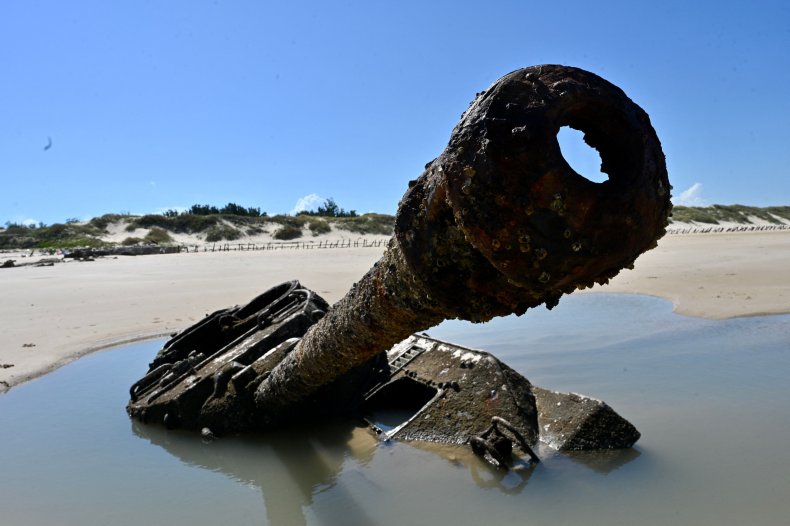ANDERS FOGH RASMUSSEN
Last week, House Speaker Nancy Pelosi visited Taiwan. In reaction, China launched its biggest military exercises ever in the region and fired multiple missiles over the island. This belligerent response shows why Pelosi was right to visit. The tragedy unfolding in Ukraine reminds us that free world cannot stand by when an authoritarian bully threatens a neighboring country.
The visit by the speaker of the House was the highest profile by a U.S. politician in two decades. During the intervening years Taiwan has become a beacon of liberty in the region. According to the Freedom House Index of political rights and civil liberties, Taiwan ranks second in Asia and joint 16thin the world—alongside Germany and Iceland. It was one of the only countries to improve its score during the pandemic. Democracy has become core to Taiwan's identity.
The opposite is true of China. Over the last 25 years, hopes that greater economic cooperation with the West would lead to liberalization have been crushed. Under Xi Jinping's leadership, China has become increasingly repressive at home and aggressive abroad. His attitude to democracy was clear in the violent crackdown and arrest of protesters in Hong Kong.
 The rusted out wreckage of an old tank is seen at Ou Cuo Sandy Beach on Taiwan's Kinmen islands, which lie two miles from the mainland Chinese coast, on Aug. 11, 2022.SAM YEH/AFP VIA GETTY IMAGES
The rusted out wreckage of an old tank is seen at Ou Cuo Sandy Beach on Taiwan's Kinmen islands, which lie two miles from the mainland Chinese coast, on Aug. 11, 2022.SAM YEH/AFP VIA GETTY IMAGESXi's aims for Taiwan echo Russian President Vladimir Putin's for Ukraine. He views it as an essential part of the motherland. This week the Chinese ambassador to France said that Taiwanese citizens would need to be 're-educated' if the island was 're-unified' with China. This was not a slip of the tongue. Meanwhile, China's first white paper on Taiwan in 22 years dropped the promise not to deploy soldiers in Taiwan in case of 're-unification.'
We can have no doubts about China's ambitions for Taiwan. For years, politicians, particularly those in Europe, willfully ignored Putin's words on Ukraine. We cannot now block our ears when Chinese officials speak on Taiwan.
Some commentators have criticized the timing of Pelosi's visit, saying it could destabilize the region. This is completely wrong. What is destabilizing the region are China's actions in the South China Sea. Allowing the Chinese Communist Party to dictate to senior U.S. politicians when and where they can visit in the region would be a huge mistake. Other leaders from the United States, Europe, and the democratic world should follow Pelosi's lead and visit Taiwan.
Visits are an important symbol of support. However, as Ukrainians tragically learned, nice words and gestures are not enough when you live in the neighborhood of an autocratic bully. Action is needed now to protect Taiwan's democratic future.
First, countries should step up military aid and cooperation with Taiwan. With a war ongoing in Europe, this task will fall mainly on the U.S. and its allies in the region. President Biden's clear remarks that the United States would defend Taiwan in case of an attack are important. The U.S. should already step up the supply of defensive weapons and military training for Taiwan, to deter China from any attempt to take the island by force. This would send a strong message that China's provocations against Taiwan are counterproductive.
Second, all democratic nations should strengthen their economic ties with Taiwan. This is already happening. The European Union has increased trade with Taiwan eightfold over the past two decades. This partnership should be deepened, as European companies look to diversify away from suppliers in autocratic states. An EU—Taiwan bilateral investment agreement would be an important step in this regard.
Stronger economic ties should go hand-in-hand with closer political ones. Democratic nations should be united when China threatens countries for enhancing ties with Taiwan, as it did with Lithuania.
Lastly, democratic countries should make clear to China the consequences that would follow an attack on Taiwan. The free world has shown impressive unity in response to the war in Ukraine, with crippling sanctions agreed in record time. China should understand that they would face an equally unified response. This would have an even greater effect considering Chinese reliance on exports to fuel its growth. Making the economic consequences clear now can be an important deterrent against any attack.
Xi Jinping's vision of re-unification with China is not shared by the vast majority of Taiwanese citizens, who cherish their democratic freedoms and firmly oppose Chinese threats of force. The free world must not abandon them. Politicians in the U.S. and Europe failed to deter an attack on Ukraine's democracy, they must not make the same mistake with Taiwan.
No comments:
Post a Comment